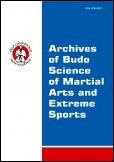2023, Volume 19, Issue 1
Effect of outdoor recreation activity on mental toughness of taekwondo athletes in competition period
Behnam Boobani1, Juris Grants1, Iveta Boge1, Tatjana Glaskova-Kuzmina2, Inta Bula-Biteniece1, Władysław Jagiełło3, Artur Litwiniuk4
1Latvian Academy of Sport Education, Riga, Latvia
2Institute for Mechanics of Materials, University of Latvia, Riga, Latvia
3Gdansk University of Physical Education and Sport, Gdańsk, Poland
4Jozef Pilsudski University of Physical Education in Warsaw, Faculty of Physical Education and Health, Biala Podlaska, Poland
Author for correspondence: Artur Litwiniuk; Jozef Pilsudski University of Physical Education in Warsaw, Faculty of Physical Education and Health, Biala Podlaska, Poland; email: artur.litwiniuk@awf.edu.pl
Full text
Abstract
Background & Study Aim: Taekwondo mixes mental and physical training into a helpful leisure activity. The research focusing on the impact of taekwondo on psychological health, although limited, suggests it is associated with several positive outcomes. These include increased cognitive and affective self-regulation and prosocial behaviour in children and reduced aggressive behaviour in the youth and teenager population. The aim of this study is knowledge about the effect of outdoor recreation activity (walking in nature) on mental toughness components (confidence, control, and constancy) of taekwondo athletes during the competition period.
Material & Methods: The participants of this study were 12 Latvian taekwondo athletes, including males (n = 6) and females (n = 6), aged 17-23. The experiment was held four weeks before the International Sweden Taekwondo Competition (2022). The participants had twelve sessions, including 40 minutes of outdoor recreation (walking in nature), in zones 1 and 2 (HR 101-141 bpm). The Sport Mental Toughness Questionnaire (SMTQ) measured the mental toughness components (confidence, constancy, and control). The data was analyzed using the mean, standard deviations, the Shapiro-Wilk test, and paired sample t-test.
Results: The outdoor recreation activity (walking in nature) did not significantly affect the component of mental toughness (confidence t (11) = 0.451 as the p-value 0.837 >0.05, for constancy t (11) = −0.233; as the p-value 0.820 >0.05 and control t (11) = 0.117; as the p-value 0.909 >0.05) at the 5% level.
Conclusions: Gender disparities exist in the mental toughness components of confidence, constancy, and control among Latvian taekwondo athletes. In particular, male athletes revealed higher average scores in confidence and constancy, with control scores remaining consistent across both male and female athletes. Furthermore, male athletes showed less variability in their confidence and constancy scores when compared to their female counterparts.
Key words: combat sport, innovative agonology, Likert scale, marital arts, self-confidence





